 Petzlover
PetzloverChippiparai is originated from India but Snorkie is originated from United States. Chippiparai may grow 33 cm / 13 inches higher than Snorkie. Chippiparai may weigh 14 kg / 31 pounds more than Snorkie. Both Chippiparai and Snorkie has same life span. Both Chippiparai and Snorkie has almost same litter size. Chippiparai requires Low Maintenance. But Snorkie requires Moderate Maintenance
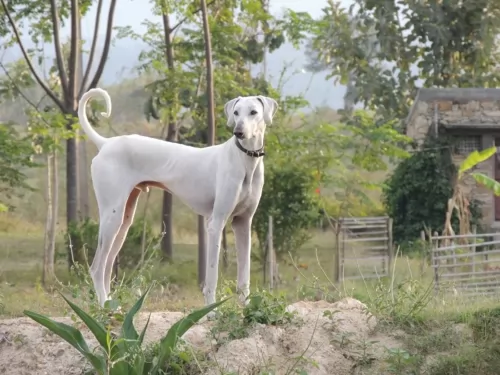 The Chippiparai is a working dog found in India and until recently there has been little interest in the purity of any breed, but rather only an emphasis on the abilities of the dog. They are only beginning to research the origin and history of their native dogs such as the Chippiparai. Not much is known about the origin of the breed except that it is found almost exclusively in Tamil Nadu and Keraia in the southern part of the subcontinent of India. Other than this there is much speculation about the breed’s origin but very little-known facts. It is indeed an ancient breed; however, its origin could be thousands of years ago or simply hundreds of years ago.
The Chippiparai is a working dog found in India and until recently there has been little interest in the purity of any breed, but rather only an emphasis on the abilities of the dog. They are only beginning to research the origin and history of their native dogs such as the Chippiparai. Not much is known about the origin of the breed except that it is found almost exclusively in Tamil Nadu and Keraia in the southern part of the subcontinent of India. Other than this there is much speculation about the breed’s origin but very little-known facts. It is indeed an ancient breed; however, its origin could be thousands of years ago or simply hundreds of years ago.
• Perhaps it is a descendant of the Saluki as it resembles this breed quite a bit. It has been believed for some time that the Saluki is the original sighthound and the source of all sighthound breeds. The Saluki was very popular in the Middle East, especially in Persia and Arabia from which it could easily have spread to India. It would then have been shared from Northern India to Southern India where the Chippiparai is found.
• Perhaps the Chippiparai is a descendent of sighthounds from Central Asia and Afghanistan – the Tazi, Taigan, Hortaya Borsaya or the Afghan Hound. This part of Central Asia had more trade, influence and contact with the Indian subcontinent early in their history than with any other region. The Chippiparai is considered by some to be more like these sighthounds than like the Saluki and the interaction between these regions has a much longer history than the Middle East and India.
• It is also speculated that the Chippiparai might have been developed completely and uniquely from the local street and working dogs. With the civilization of India being one of the oldest in the world, it is considered a possibility that the Chippiparai is the descendent of the Harappan hunting dogs that probably were developed by the Indus Valley or Harappa roiling class.
Wherever the Chippiparai came from, they were the exclusive property of the wealthy and ruling castes. These upper castes were the only ones that could legally hunt with dogs or afford to feed one. The royal classes of Tiruneivell, Thanjavur, and Madurai all fed the popularity of the breed among the upper castes. They were coursing dogs used to chase down the prey once it was sighted. The Chippiparai are incredibly fast runners and would catch almost any prey and either hold it or kill it for their hunter. The Chippiparai, when not hunting, had to be chained so they would not chase any small animal that they saw. This confinement also added to the purity of the breed as random breeding was prevented.
The southern part of the Indian subcontinent is extremely hot with routine temperatures over 100’. The Chippiparai was developed to withstand these extreme temperatures and is more heat tolerant than most any other breed. They also need very little food and are resistant to the many parasites and diseases found in southern India.
Harboring the belief that Indian dogs were not as good as European ones, the occupying countries of Portugal, France, and Britain, had no interest in the Chippiparai, again leaving the breed to develop naturally on their own with little or no interbreeding. They also received no formal recognition because Indian culture only valued the dog for its working abilities. There was no Indian Kennel Club until 1956.
The Chippiparai is now very rarely and only found in the area of its birth. Many believe the breed is in danger of becoming extinct and even though it is now registered with Indian Kennel Clubs it is not often shown in their dog shows. Lovers of the breed are now attempting to get Indians to recognize that the Chippiparai is a great companion animal and attempting to save the breed.
The Snorkie is not a purebred dog. It is a cross between the Yorkshire Terrier and the Miniature Schnauzer.
The exact origins of this dog are unknown, but it is believed that it is a designer dog from the United States. Known also as the Schnerrier, this toy breed is a popular pet as he can slot into life in the city or the countryside, in small homes or large.
The Snorkie’s history is short and unknown but both the parent breeds each have a long history.
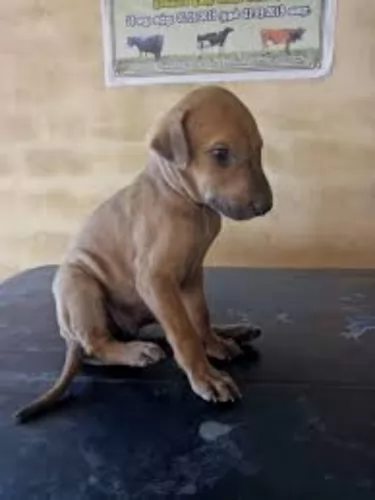 The Chippiparai is a typical sighthound although their size and appearance will vary more than that of registered purebred sighthounds. Typically, they will have a long, domed head with small erect ears and dark eyes. Their muzzle will be as deep and wide as the skull but longer. Their legs are straight and long, their chest is roached back and deep, giving them, an appearance very similar to a greyhound or other sighthound.
The Chippiparai is a typical sighthound although their size and appearance will vary more than that of registered purebred sighthounds. Typically, they will have a long, domed head with small erect ears and dark eyes. Their muzzle will be as deep and wide as the skull but longer. Their legs are straight and long, their chest is roached back and deep, giving them, an appearance very similar to a greyhound or other sighthound.
They have a long curly tail, and their coat can vary greatly in color. They are medium sized, and their coat is short, shiny and close. He is very slender and sleek, which along with his long legs gives him that incredible speed. They are thin with visible ribs.
Coming from two small dog breeds, the Snorkie will be small too, and will measure anything from 14 to 30cm and weigh anything from 3 to 6kg.
The Yorkshire Terrier and the Miniature Schnauzer are fairly similar to look at and you will no doubt get high set erect ears, a small, compact body and a medium length tail which will be thickly furred.
The coat of the dog will be longish and could end up being the silky hair of the Yorkie or being the crisp coat of the Schnauzer. Colors of the coat can be grey, tan, silver, black. Shedding will be minimal.
When you get two purebred dog breeds being used to bring about a new dog breed, you cant really say what the temperament of the dog will be – because it could actually be a mix of characteristics from either breed. Either way your little pet will be social, playful, loving, loyal and companionable and make a great little watchdog.
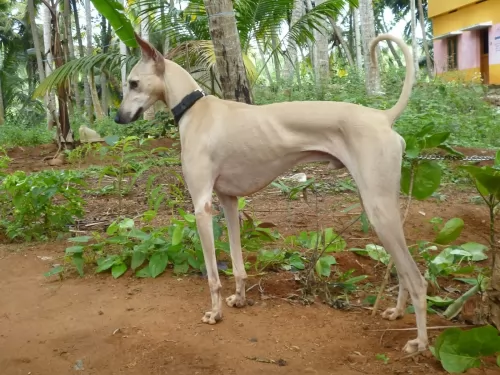 The Chippiparai is a loving, gentle family dog if well socialized, well trained and well exercised. They are very intelligent and need human companionship. Once they are living with a human family, they are very protective of that family. They are for the most part peaceful and quiet dogs. They are loyal and loving but they are not overly affectionate. Cuddlers they are not, and they do not like to play rough with children.
The Chippiparai is a loving, gentle family dog if well socialized, well trained and well exercised. They are very intelligent and need human companionship. Once they are living with a human family, they are very protective of that family. They are for the most part peaceful and quiet dogs. They are loyal and loving but they are not overly affectionate. Cuddlers they are not, and they do not like to play rough with children.
Accepting and loving within the family, the Chippiparai are equally hesitant and shy around strangers. They can be suspicious, but they are not aggressive. They are just very aloof with strangers, yet they hardly ever bark.
Your Snorkie will be a sociable little dog who loves hanging out with his human family. He is loyal and loving towards them. He gets on well with children in the home as well as with other pets.
Small he may be, but he makes a great watchdog and will alert you to suspect behavior with his constant yapping.
Suitable for life in the city or the countryside and also a great choice for first time dog owners, the Snorkie promises to make you an awesome family pet.
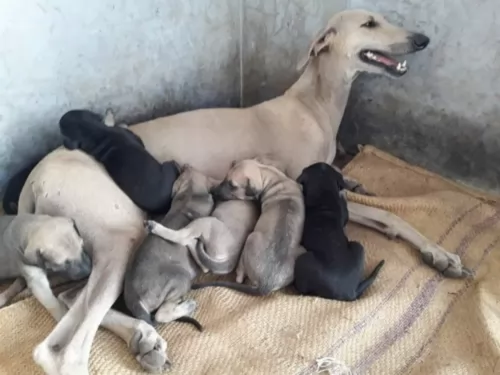 There are no clinical studies regarding the health and health history of the Chippiparai, so little is known about their long-term health. However, most who know the breed, believe it is an incredibly healthy one. They seem to have a lot less genetically transmitted health issues than other purebreds. Because of their isolation for centuries in India, they have developed immunities and resistance to most parasites and diseases other dog suffer from.
There are no clinical studies regarding the health and health history of the Chippiparai, so little is known about their long-term health. However, most who know the breed, believe it is an incredibly healthy one. They seem to have a lot less genetically transmitted health issues than other purebreds. Because of their isolation for centuries in India, they have developed immunities and resistance to most parasites and diseases other dog suffer from.
Because of this you should look for the types of issues that occur in dogs of this size and build. Have them tested by the Canine Eye Registration Foundation and the Orthopedic Foundation for Animals.
Because a Snorkie is a mixed breed, they can inherit any one of the health issues from each of the parent breeds – the Yorkshire Terrier and the Miniature Schnauzer.
Because this is a small dog, you can probably expect dental problems - overcrowded teeth and pancreatitis. The idea is to make sure you feed your little pet excellent food to minimize health issues.
The pancreas has many functions, one of which is the production of digestive enzymes which are critical for food digestion.
Pancreatitis is inflammation of the pancreas and then digestive enzymes, normally inactive until they reach the small intestine, become active in the pancreas instead. This brings about swelling and pain. Obesity, medications, high-fat diets and a disease such as hypothyroidism can cause pancreatitis.
Your dog will lose his appetite, be lethargic and restless and be vomiting too. He will have to get to the vet.
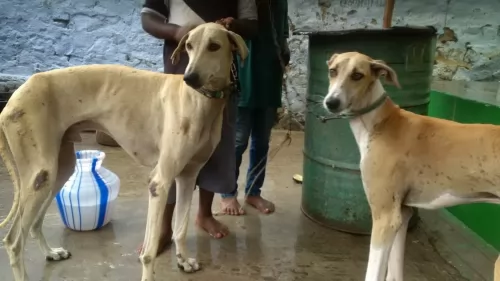 Do not overfeed your Chippiparai. Feed twice a day and no more than a total of 2.5 cups of high quality dry food.
Do not overfeed your Chippiparai. Feed twice a day and no more than a total of 2.5 cups of high quality dry food.
As mentioned previously the Chippiparai seems to have no genetic diseases or issues and very few acquired ones. However, he is sensitive to anesthesia and some foods. He is intolerant to cold weather and has a hard time with his pads on hard surfaces. Some Chippiparai might experience some of the ailments other breeds like them experience.
Both Elbow and hip are possible. This can cause arthritis and lameness. This occurs when the bone does not fit well into the joint.
This can cause lameness as well. The kneecaps slide over the knee instead of staying in place.
This is a hunting dog and he will want to hunt. They are incredibly fast and need the opportunity to run. Brisk walks will not be enough for this dog. He is very energetic. They will chase any small animals. It is not recommended that you have small pets even small dogs or cats with a Chippiparai. Having been bred for centuries to hunt, they are not likely to respond to any commands if they are off lease and chasing prey. Do not allow them to be off leash unless in a fenced area, and that fence needs to be 8 feet tall as they can easily jump a seven-foot fence. Try they at coursing, agility, fly ball and frisbee competitions.
Being a small dog, the Snorkie will be fairly easy to care for, and for anyone on a low budget who badly wants to own a dog, he won’t cost you a whole lot of money in food.
◆Brush the coat twice a week to rid the coat of loose hairs. The Snorkie isn’t a heavy shedder but he loves the grooming session. His coat may need to be professionally trimmed.
◆When you brush him, check for fleas and ticks. Check inside the ears for redness and make sure the eyes are bright and alert.
◆The Snorkie is small but will be a handful if left untrained. He is intelligent and will make a superb pet if he is trained and socialized.
◆Keep his vaccines up to date to eliminate killer canine diseases and get him to the vet if he appears to be ill.
◆Feed your Snorkie the best food there is. The commercially manufactured dog foods can be a good, convenient choice. Read the labels and buy the food appropriate to your pets size, age and energy levels.
Try and give him some home-made food. You can add a little bit of home-made food to the dry kibble to enhance it. You can do this twice a week. Boiled chicken, brown rice or pasta and spinach, sweet potatoes and carrots are a tasty healthy choice for your little pet. Just chop it all up for him.